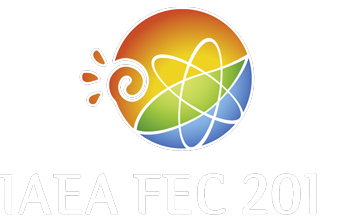Speaker
Dr
Junghee Kim
(National Fusion Research Institute)
Description
Energetic ions generated by auxiliary heating and fusion reactions are able to produce the characteristic Alfvenic activities such as excitation of Alfvén eigenmodes (AE) and high-frequency chirping modes through wave-particle interactions. In KSTAR on-axis neutral beam injection (NBI) is a main supplier of the fast ions, and has two primary roles which are heating and current drive. Beam-ions produces radial fast-ion pressure profile that can drive the energetic particle modes including AEs. Neutral beam current drive (NBCD) could change the phase space of the fast-ion distribution, hence the excitation condition of the AE is varied. Most of high-performance/advanced discharges such as high beta_p or hybrid operation scenarios have shown the active Alfvénic modes, which may be caused by the enhanced fast-ion pressure gradient and the broad current density profile in the core region. Depending on the energy and the ion-source of the neutral beams, changes in frequency and amplitude of the AEs have been found and bursting energetic-particle continuum mode (EPM) can be excited or eliminated. It implies that NBI, utilized with the operation scenario, can be used as one of promising control tools to mitigate the AEs since fast-ion pressure and beam-driven current profiles have the primary role of exciting/mitigating the AEs. In addition, preliminary observations on the fast-ion losses, which seem to be associated with the multiple n-mode AEs or the fast-sweeping modes, are discussed in this presentation. Experimental observations of the AEs in the high-performance discharges are identified and categorized by the intensive modelling using the numerical codes such as CRONOS, NOVA and so on.
| Country or International Organization | Republic of Korea |
|---|---|
| Paper Number | EX/P4-26 |
Author
Dr
Junghee Kim
(National Fusion Research Institute)
Co-authors
Mr
C.S. Byun
(Seoul National University)
Prof.
C.Z. Cheng
(National Cheng Kung University)
Dr
H.-S. Kim
(National Fusion Research Institute)
Mr
H.S. Kim
(National Fusion Research Institute)
Dr
Jun Gyo Bak
(National Fusion Research Institute)
Mr
Jun Young Kim
(Korea University of Science and Technology)
Dr
Kouji Shinohara
(Japan Atomic Energy Agency)
Dr
M.H. Woo
(National Fusion Research Institute)
Dr
Tongnyeol Rhee
(NFRI, Daejeon, South Korea)
Prof.
Yong-Su Na
(Seoul National University)

